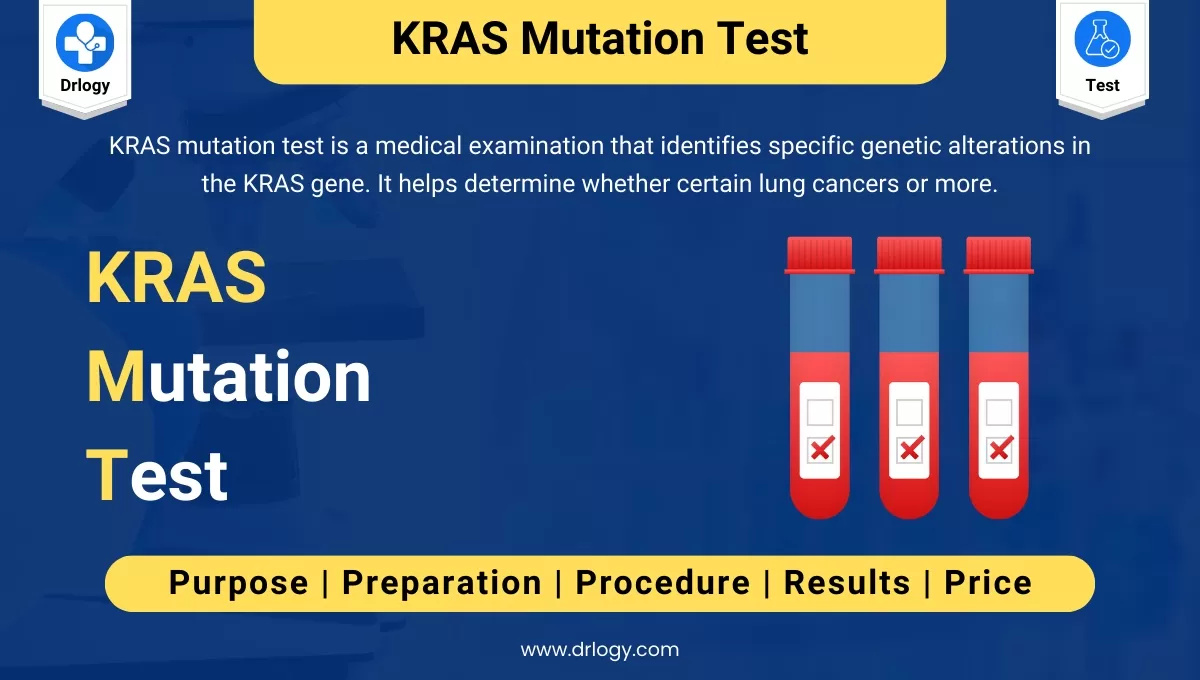
The KRAS mutation test is a medical examination that identifies specific genetic alterations in the KRAS gene. It helps determine whether certain cancer treatments will be effective, particularly in cases of colorectal and lung cancers, as KRAS mutations can impact treatment decisions.
Here are the basic details of the KRAS Mutation Test.
| Also Known As | KRAS Test |
| Type | Molecular genetic test |
| Purpose | Detect KRAS gene mutations |
| Sample Type | Tissue or blood |
| Preparation | No specific preparation |
| Fasting | Fasting not required |
| Gender | All |
| Age Group | All |
| Normal Value | Negative (No KRS Mutation) |
| Reporting Time | Few Days to week |
| Cost | 10,000-20,000 INR* |
*KRAS Mutation Test Price range may vary as per location, lab type, and procedure of lab test.
KRAS Mutation Test is a Molecular genetic test to detect KRAS gene mutations.
The purpose of the KRAS Mutation Test is to:

Here is the basic preparation for the KRAS Mutation Test.
Here is the basic KRAS Mutation Test Procedure.
Here is basic meaning of KRAS Mutation Test.
Here is the normal result of the KRAS Mutation Test.
| KRAS Mutation Test Result | Interpretation |
|---|---|
| Negative | No KRAS Mutation detected |
Here is the Interpretation of the KRAS Mutation Test.
| KRAS Mutation Test Result | Interpretation |
|---|---|
| Positive | KRAS Mutation detected |
| Negative | No KRAS Mutation detected |
Here are the potential causes of KRAS Mutation Test Positive Results.
| Potential Causes | Information |
|---|---|
| KRAS Gene Mutation | Presence of a mutation in the KRAS gene within cancer cells, indicating resistance to some targeted therapies. |
Here are the potential causes of KRAS Mutation Test Negative Results.
| Potential Causes | Information |
|---|---|
| Absence of KRAS Mutation | Lack of a specific KRAS gene mutation in tested cancer cells, suggesting potential responsiveness to targeted therapies. |
| Insufficient Sample | Negative results can occur if the tumor tissue sample was inadequate for testing or if the mutation is present in only a subset of cancer cells. |
| Other Resistance Mechanisms | A negative result does not guarantee therapy effectiveness, as other resistance mechanisms may exist. |
Here are the specimen requirements for the KRAS Mutation Test.
| Specimen Type | Blood or Tissue |
|---|---|
| Volume | Four unstained slides and one matching H&E-stained slide at 5 μM or formalin-fixed, paraffin-embedded tissue block |
| Minimum Volume | Two unstained slides and one matching H&E-stained slide at 5 μM. Samples with >4 mm² and ≥20% tumor content are preferred. |
| Container | Slides, blocks |
| Storage Instructions | Maintain the specimen at room temperature for up to 4 weeks at 15-30°C. |
| Causes for Rejection | Tumor block containing no tumor tissue; tumor fixed in a heavy metal fixative; broken or stained slides. |
KRAS Mutation Test is generally safe, but risks may depend on the sample collection method.
Here is the basic limitation of KRAS Mutation Test.
Here are some of the risk factors of the KRAS Mutation Test.
Here are the Doctor's recommendations or consult a specialist after the KRAS Mutation Test.
| Test Results | Doctor to Consult | Reason to Visit |
|---|---|---|
| Positive | Oncologist | Determine alternative treatment options. |
| Negative | Oncologist | Discuss targeted therapy possibilities. |
Here are the estimated KRAS Mutation Test Prices in India with different top cities:
|
City |
Price Range (INR)* |
|
10,000-20,000 |
|
|
11,000-20,000 |
|
|
10,000-20,000 |
|
|
11,000-20,000 |
|
|
10,000-20,000 |
|
|
11,000-20,000 |
|
|
10,000-20,000 |
|
|
11,000-20,000 |
|
|
11,000-20,000 |
|
|
10,000-20,000 |
|
|
11,000-20,000 |
|
|
10,000-20,000 |
|
|
11,000-20,000 |
|
|
10,000-20,000 |
*Prices are approximate and vary depending on a specific laboratory or healthcare facility.
Summary
Overall, KRAS Mutation Test identifies specific mutations in the KRAS gene, assisting in tailoring effective treatments for colorectal and lung cancers. Also check Drlogy Test for detailed information about all medical tests for patients, doctors, scholers and medical students.
Reference
DOCTOR'S MOST TRUSTED HEALTHCARE PLATFORM
10M+
Patients
30000+
Doctors
25000+
Hospitals/Labs